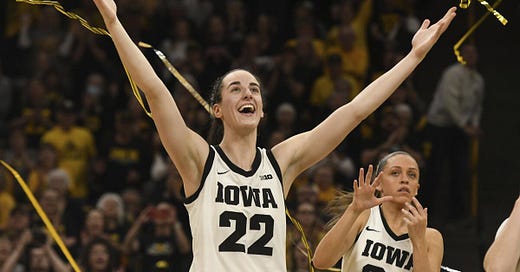So...what is Caitlin Clark's final collegiate legacy? It's complicated.
As she heads off to the WNBA, how does one make sense of where the Iowa superstar falls among the collegiate greats?
I took a bit of a Twitter break during the NCAA Women’s Basketball Tournament. Mostly, because I felt myself too involved in my phone and ignoring the world around me. Who among us, right?
But in watching the Tournament divorced from the bubble of women’s basketball diehards, I learned quite a bit about how the outside world — the casuals, if you will —…
Keep reading with a 7-day free trial
Subscribe to No Cap Space WBB to keep reading this post and get 7 days of free access to the full post archives.




